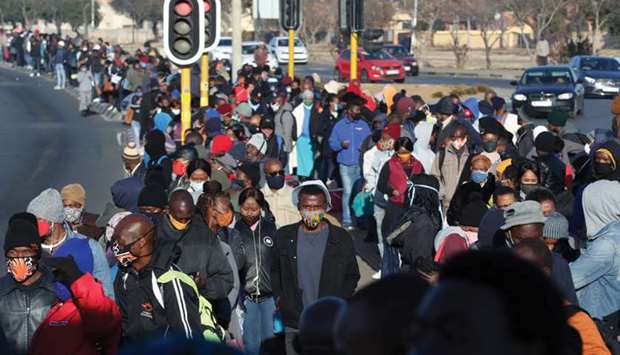South African President Cyril Ramaphosa yesterday warned “tough times” lie ahead as the continent’s most industrialised country braces for the economic fallout from its coronavirus restrictions.
Ramaphosa imposed a strict lockdown on March 27 to try to limit the spread of Covid-19 and prepare hospitals for an expected surge in cases.
But the move has cost the economy dearly.
South Africa was already in recession and the unemployment rate heading towards 30% when the virus arrived.
Since last month the government has started loosening the lockdown to enable business activity to gradually resume.
“For a country such as ours, which was already facing an unemployment crisis and weak economic growth, difficult decisions and difficult days lie ahead,” Ramaphosa said in his weekly newsletter.
“There are tough times ahead. There are no quick-fixes and we have to be realistic about our prospects,” he said.
“We would urge that the difficult decisions to be taken are taken with care and with due regard to balancing the sustainability of companies and the livelihoods of workers,” he urged as companies have in recent days started announcing layoff plans.
The national statistics agency releases the first-quarter unemployment figures today.
Finance Minister Tito Mboweni is due to present a revised budget tomorrow after government announced an unscheduled 500bn rand ($29.7bn) economic stimulus and social relief package, including 100bn rand for job protection.
Meanwhile, minibus taxi drivers in South Africa’s most populous Gauteng province went on strike yesterday to demand more relief funding, leaving thousands of commuters stranded in the country’s economic hub.
The usually crammed privately-owned vehicles have been limited to 70% capacity under social distancing measures imposed since March 27.
The South African National Taxi Council (SANTACO) had on Friday called for a shutdown of minibus services on June 22 and 23 after Transport Minister Fikile Mbalula announced a 1.1bn rand ($63mn) relief payment to registered taxi operators — amounting to 3,500 rand ($202) per driver.
The union called for “at least” 20,000 rand ($1,154) per vehicle and urged strike action in Gauteng, home to South Africa’s administrative capital Pretoria and financial centre Johannesburg.
Dozens of taxi drivers parked their white minibuses across roads yesterday and barred commuters from seeking alternative forms of transport.
SANTACO condemned the road blocks and “intimidation of people” via Twitter, calling for the taxi industry to “demonstrate a peaceful shutdown”.
Videos posted on social media showed police firing tear gas to disperse the protest.
To date the country has the highest number of coronavirus cases in Africa, with over 97,300 recorded infections and at least 1,930 deaths.
Namibia relaxes curbs
Namibia’s President Hage Geingob yesterday announced a further easing of the country’s lockdown to boost economic activity, despite a rise in confirmed Covid-19 cases.
Geingob said the country would move from ‘stage 3’ to ‘stage 4’ of a five-level exit from lockdown plan, except for the Erongo region — where the harbour town of Walvis Bay is located and which is Namibia’s coronavirus hotspot.
“The government’s approach, to further relax national restrictions under Stage 4, aims to boost social and economic activities, while continuing to advocate for intensified public adherence to health and hygiene protocols to safeguard our successes,” Geingob said.
Namibia has confirmed 63 cases of the novel coronavirus, with 17 new cases identified in the past 48 hours.
Geingob said under the relaxed regulations, which are effective June 30, a limited number of tourists from “a carefully selected low-risk market” would be admitted to help revive a sector that employs 100,000 people.
Casinos and gambling houses will open for pre-booked clients with no walk-ins, while informal gambling houses will be allowed to open as long as they maintain a logbook.
The relaxed regulations will also see the number of people allowed at public gatherings such as weddings, funerals and religious services increased to 250 from 50.
Sporting activities will now be permitted, subject to adherence to the public gathering limit.
Geingob said the country could move to ‘stage 5’ in September, which will see borders reopen as well as the resumption of air travel.
Liberia toughens curfew
The West African state of Liberia said yesterday it would extend anti-coronavirus measures and immediately toughen a nightly curfew after recording a rise of infections.
President George Weah has decided to extend a state of emergency, announced on April 8 and due to expire yesterday, for another 30 days until July 21, his office said in a statement.
The extension must be approved by parliament but in an immediate step, the government announced that a 9pm curfew would henceforth start at 6pm, ending as before at 6am.
The harsher stance contrasts with that of other African countries where restrictions have been eased in response to concern about their impact on the economy.
“The general public no longer seem to comply with the health protocols which have up to this point helped prevent a much wider transmission of the disease in the country,” the authorities said in a statement.
The reopening of Roberts International Airport in the capital Monrovia, which was initially scheduled for June 21, has been postponed until June 28.
Other restrictions remain in place, including closed borders and bans on public gatherings and travel between regions, although schools have partially reopened.
Liberia has recorded 626 cases of Covid-19, 34 of which have been fatal.
One of the world’s poorest economies, the country was battered by civil wars between 1989 and 2003 that claimed around a quarter of a million lives, and by West Africa’s 2014-16 Ebola pandemic, which killed 4,800 people in Liberia alone.

Stranded commuters wait for transportation at a bus terminal during a protest yesterday by taxi operators in Soweto.
